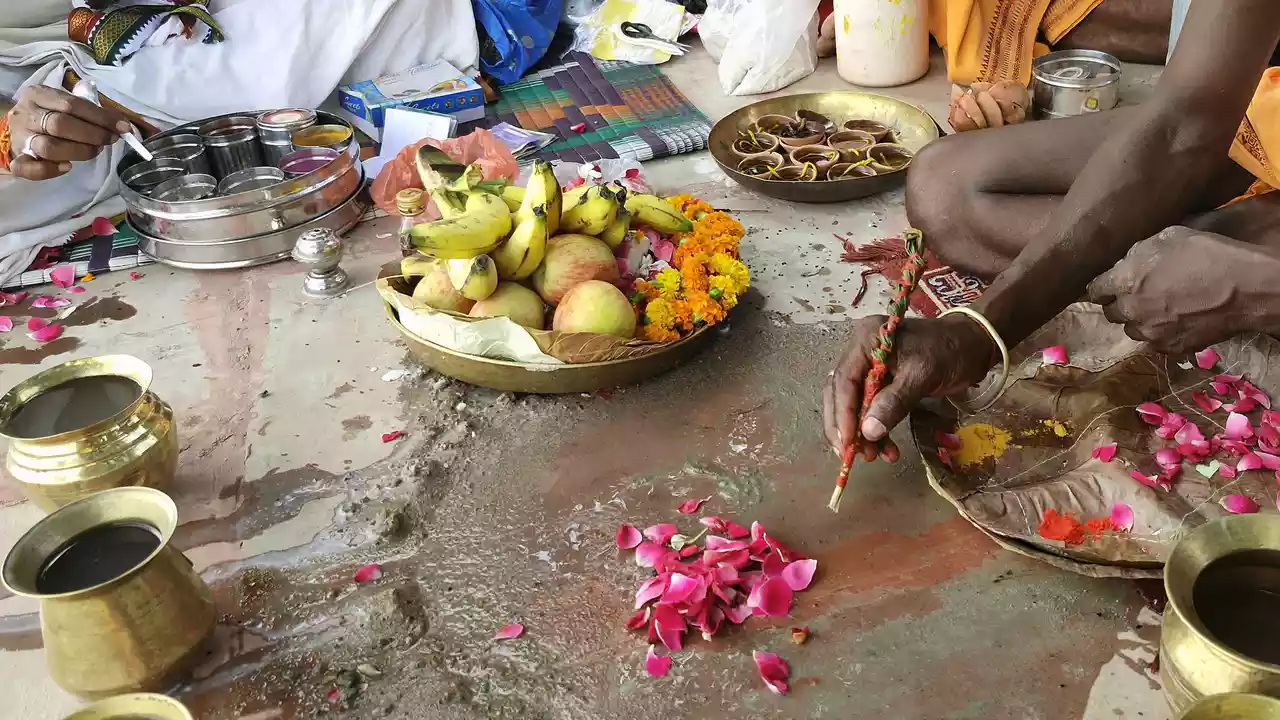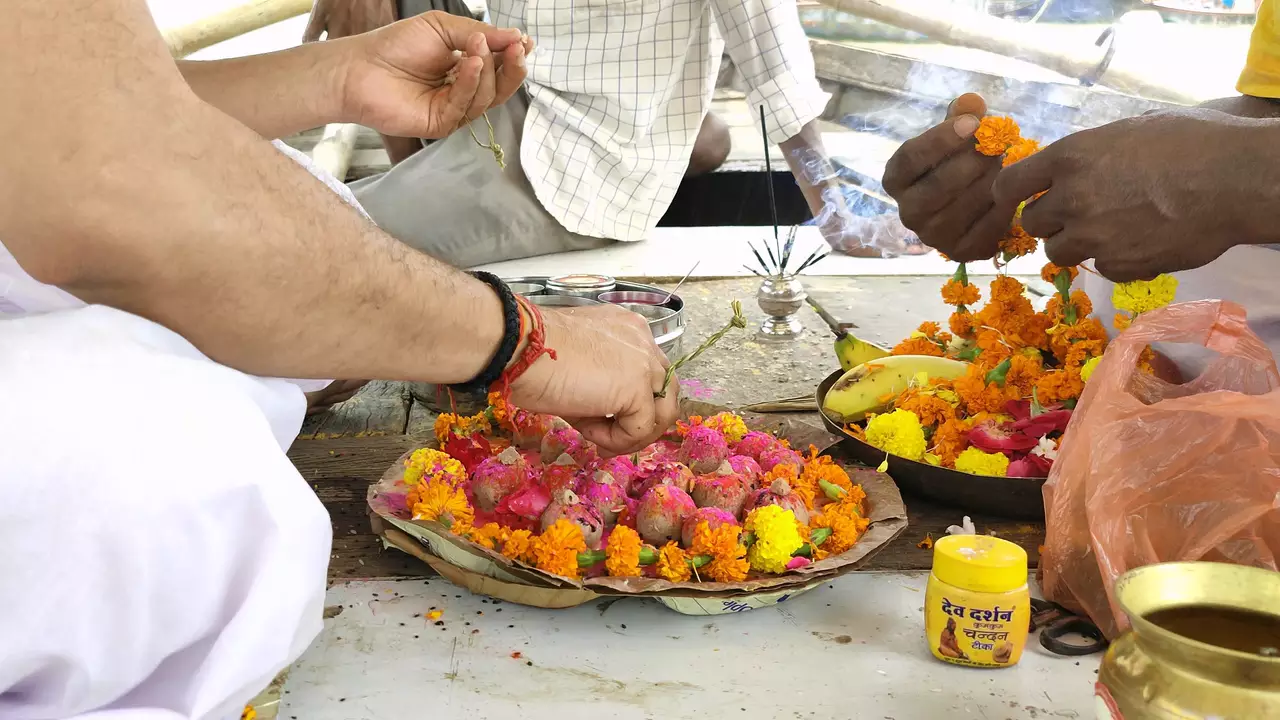Namaste,
The impact of Shradh on the human spirit, the mind, the emotions. It is a perceptive question. For our ancient Rishis, who cognized these practices, understood the intricate tapestry woven between the spiritual, the emotional, and the psychological. They knew that Dharma is not meant to be a dry obligation but a path that nourishes the whole being. The emotional benefits of Shradh, while perhaps not always explicitly labeled as such in the Puranas, are profoundly embedded within the practice itself.
More Than Ritual: The Deep Emotional & Psychological Benefits of Shradh
While we often speak of Shradh in terms of Pitri Rin (ancestral debt), tripti (satisfaction) for the Pitris, and the accumulation of punya (merit), let us not overlook the immediate and palpable effects it has on the performer – the living descendant navigating the complexities of life and loss.
The Healing Touch of Shraddha: Faith, Love, and Remembrance

As we have established, the very essence of Shradh is Shraddha – faith, devotion, sincerity. This is not merely intellectual belief; it is an active engagement of the heart.
- An Outlet for Love and Connection: When you perform Shradh, preparing the offerings, chanting the mantras, focusing your intention on your ancestors, you are actively expressing love and remembrance. In a world that moves relentlessly forward, Shradh provides a sacred pause, a dedicated time to reconnect with those who shaped your existence. This act of conscious remembrance, performed with love, can be incredibly comforting, filling a void left by physical absence. It transforms passive memory into active reverence. The emotional benefits of Shradh truly begin with this heartfelt connection.
- Inner Peace through Meritorious Action: The Padma Purana describes Shradh performed with faith (Shradh) as meritorious and holy, something that gives (long) life, and destroys all sins. Consider the psychological impact of engaging in an act you believe to be profoundly good and sacred. It fosters a sense of righteousness, purity, and inner peace. Knowing you are performing a holy duty, blessed by scriptures, can quieten inner turmoil and generate positive self-regard.
Finding Meaning and Contentment in Duty
Loss can often leave us feeling helpless, questioning our role now that our loved ones are gone. Shradh offers a way to channel these feelings into purposeful action.
- Alleviating Helplessness: The desire to care for those we love doesn’t cease with their passing. Shradh provides a tangible way to continue offering care, albeit on a subtle level. As the Skanda Purana suggests, performing Shradh brings satisfaction to the Pitris. Believing that your actions are genuinely benefiting your ancestors, providing them sustenance and peace in their realm, counters the feeling of powerlessness that grief can bring. It offers a sense of agency and purpose – “I am still doing something for them.”
- The Contentment of Fulfilling Dharma: Our tradition views honouring ancestors as a fundamental duty (Dharma). Fulfilling this sacred obligation brings a deep sense of inner contentment and psychological balance. It aligns us with the cosmic order, reassuring us that we are playing our part correctly. This sense of ‘doing the right thing’ according to time-honoured wisdom is a powerful balm for the soul.
Weaving the Tapestry of Lineage: Belonging and Identity
In modern times, individuals can often feel adrift, disconnected from their past. Shradh serves as a powerful anchor, rooting us firmly in our lineage.
- Strengthening Roots and Identity: Performing Shradh is a conscious act of acknowledging “I am because they were.” It reinforces your connection to the generations that preceded you, reminding you that you are part of an unbroken chain. As the Skanda Purana notes, performing Pitr Tarpaṇa (water libations for ancestors, a key part of Shradh) with devotion strengthens this link. This deep sense of belonging, of having roots that stretch back through time, fosters emotional security and a stable sense of identity, counteracting feelings of isolation or insignificance. Knowing your Gotra, your lineage, and honouring it, gives a unique psychological grounding.
- Continuity and Shared Values: Shradh often involves recalling family stories, remembering the qualities of ancestors, and implicitly, the values they stood for. This reinforces family traditions and provides a sense of continuity, assuring us that life, values, and legacy endure beyond individual lifespans. It helps contextualize our own lives within a much larger narrative. This connection to a living history is one of the significant emotional benefits of Shradh.
Ritual as a Container: Structuring Grief and Fostering Mindfulness
Grief is often chaotic, overwhelming, and unpredictable. The structured nature of Shradh provides a much-needed container for these powerful emotions.
- A Framework for Emotional Processing: The Puranas, like the Brahma Purana, outline specific procedures for Shradh – preparing the space, invoking the ancestors, making offerings, reciting mantras, feeding Brahmins. This structured sequence provides a pathway through the often-turbulent waters of grief and remembrance. Instead of being drowned in emotion, one is guided through a series of meaningful actions. This ritualistic framework allows for the safe expression and processing of emotions within a supportive and sacred context.
- Mindful Engagement: Performing Shradh correctly requires focused attention – on the mantras, the offerings, the intentions. This focus can act as a form of mindfulness, drawing the practitioner away from anxious or sorrowful thoughts and into the present moment of sacred action. This mindful engagement can be deeply calming and centering, providing temporary respite from the pain of loss while simultaneously honouring its source.
Cultivating Gratitude Amidst Loss
While Shradh involves remembrance of those departed, it subtly shifts the focus from the pain of absence to gratitude for their presence and legacy.
- Acknowledging the Gift of Life: By honouring parents, grandparents, and great-grandparents, Shradh compels us to acknowledge the very source of our life. This fosters a deep sense of gratitude for the sacrifices, love, and efforts of those who came before, allowing us to exist. Shifting from grief to gratitude, even momentarily, is psychologically uplifting.
- Appreciating Legacy: Remembering ancestors often brings to mind their contributions, their strengths, the lessons learned from them. Shradh encourages focusing on this positive legacy, fostering appreciation rather than dwelling solely on the loss.
Harmony, Hope, and the Power of Blessings

The belief that Shradh pleases the ancestors and brings their blessings has profound psychological implications.
- Fostering Inner Harmony: The Skanda Purana mentions that Shradh pleases not only the Pitris but also the Devas (Gods) and other human beings. This suggests that the act creates a state of harmony – within oneself, with one’s lineage, and with the cosmos. Feeling aligned and at peace with these different levels of existence contributes significantly to emotional well-being. The emphasis in texts like the Varaha Purana on performing Shradh with devotion underscores that this inner state of harmony is both a prerequisite and an outcome of the ritual.
- Instilling Security and Hope: The belief, supported by texts like the Skanda Purana mentioning prosperity in both worlds, that satisfied ancestors bestow blessings (for health, longevity, progeny, success) provides a powerful psychological anchor. It instills a sense of being watched over, protected, and supported by benevolent ancestral forces. This feeling of security can reduce anxiety about the future and foster a more optimistic outlook on life. This belief in ongoing support is a crucial emotional benefit of Shradh.
Conclusion: An Act of Healing for Descendants and Ancestors
Therefore, Shradh is far more than a mere transaction of offerings for blessings. It is a deeply therapeutic practice, rich with emotional benefits of Shradh. It is:
- An act of love and remembrance that soothes the ache of separation.
- A meaningful duty that brings contentment and alleviates helplessness.
- A vital link to our roots, fostering identity and belonging.
- A structured ritual that helps contain and process grief mindfully.
- An opportunity to cultivate gratitude for life and legacy.
- A source of hope and security, rooted in the belief in ancestral blessings and cosmic harmony.
The Puranas, in their timeless wisdom, guide us not only in fulfilling our spiritual duties but also in nurturing our emotional landscapes. By performing Shradh with true Shraddha, with a heart full of devotion as the Varaha Purana emphasizes, we engage in a profound act of healing – for our ancestors in the subtle realms, and perhaps just as importantly, for ourselves in this very life. It is a testament to the holistic understanding of human existence embedded within Sanatana Dharma.
May you always find solace, strength, and connection through the observance of these sacred rites.
|| कल्याणमस्तु ||
